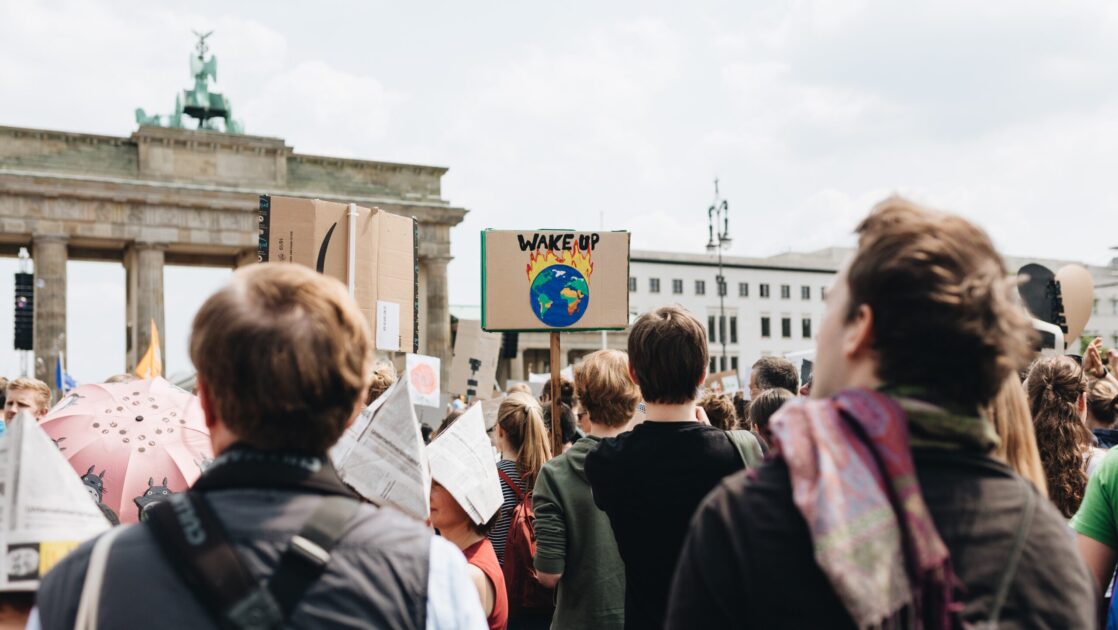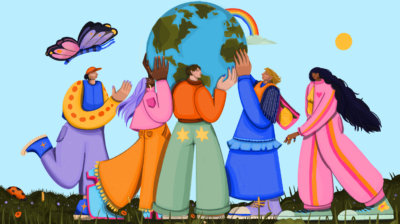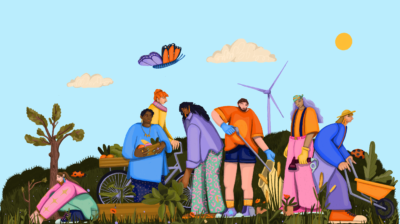Greenwashing, COP 28, and why we, as young people, are the answer
Peter O’Neill dives into the world of greenwashing at COP 28, the climate conference, and how we can take action against it.

In the build up to COP 28, you may have heard different areas of discussion and controversy about the climate conference; with the phrase ‘Greenwashing’ coming up regularly.
As we observe the debates and decisions around this important meeting of nations, headlines have pondered the question of what influence oil, gas and fuel companies are having in the Abu Dhabi conference. So, what are critics saying, how is ‘greenwashing’ happening and where do young people come into it?
Greenwashing originated as a marketing tactic to allow brands to latch onto the ‘trend’ of being ecological, sustainable and good for the environment. Like whitewashing, where a wall is uniformly covered with lime paint to hide cracks and imperfections, greenwashing makes it difficult for consumers to identify what brands are actually sustainable, and which are simply appearing to be.
It also makes climate action into a fashionable trend, rather than a legitimate movement and an urgent issue. If companies falsify numbers, like Volkwagen’s Emissions Scandal, or create vague targets and plans for future sustainability, while continuing to harm the environment (like Nestlé), it stops serious climate action from taking place and degrades young peoples’ trust in institutions, governments and businesses to take climate change seriously.
COP 28
It’s not just businesses that engage in greenwashing and that’s why there are serious concerns over the countries engaged in talks in the United Arab Emirates (UAE), and the influence of fossil fuel companies may have in proceedings. Sultan Al Jaber, this year’s COP President, has been accused of greenwashing by editing Wikipedia articles to hide his role as CEO of Abu Dhabi National Oil Company (Adnoc), who have recently pledged to increase production.
By trying to greenwash his position, the President of COP has brought the entire proceedings into disrepute. COP 28’s venue, Abu Dhabi, the capital of the United Arab Emirates (UAE), has also produced worries, as concerns over human rights in the nation and the very selection of one of the top 10 oil producers to host an international, climate conference has made COP 28 seem like one big example of greenwashing; with the UAE using COP to cultivate an image as environmental champions, suppressing their historic and current environmental and humanitarian infringements, akin to Qatar and the FIFA World Cup. It highlights the desire for transparency that young people have; a desire denied by performative actions and image-driven policy.
Fighting Words
Terminology has been crucial to international relations and greenwashing is only one of the points of contention around COP 28. The use of ‘phase down’ instead of ‘phase out’ was one of the most contested elements of COP 26; with Sultan Al Jaber being criticised for using similar language.
There have also been recent controversies over governments reeling back promises or changing goals mid-programme, such as Rishi Sunak ‘softening’ the UK’s climate policies. If governments do not stick to their promises, goals and aims, it leaves climate action toothless and allows governments to ‘greenwash’ by using their planned policies as promotional tools, before radically changing them when they start missing targets or accumulating costs. Young people need to trust their governments to act in their interests, especially concerning a future we do not yet hold the reins of.
There are also fears over the influence or indifference of the major oil, gas and fuel companies; such as Shell and BP. Despite calls for major investment in clean energy and renewable alternatives, the crises between Covid-19 and the War in Ukraine have led to increased fuel production, rather than the ‘phase-down’ of COP 26.
In fact, the International Energy Agency (IEA) found that the oil and gas industry spending on ‘low-emissions alternatives such as clean electricity, clean fuels and carbon capture technologies was less than 5% of its upstream spending in 2022’.
There have also been attempts to disrupt the conversation around these issues, with thousands of fake social media accounts being used to prop up the UAE’s claims of being environmentally aware. By denying the communicative rights of social media users, e.g. our ability to debate and analyse topics, in an environment free from disruption, the UAE are once again stopping young people from getting the full picture of what is actually being done to stop Climate Change.
Fair and honest debate is needed online and in-person for real change to happen. Governments and businesses trying to save face will do nothing for the environment, and as young people, we need to be able to cut through the smoke and hold organisations to account, despite their best efforts to disrupt proceedings.
Why we are the answer!
All of these issues with greenwashing, on an international, governmental or local level, highlight the need for accountability for those causing the most damage to our environment. And that’s where we as young people come in.
We need to use our voices (and votes) to lobby our democratic governments to act against the un-democratic and profit-driven companies that are causing the most damage to our climate, while trying to garner an image of being ‘carbon-neutral’ or ‘green’.
As young people, we have a wealth of information and tools available to us to, to help us fact-check and investigate claims of sustainability.
Need more information, advice or guidance?
We offer information, advice and guidance about the issues that matter to you. Our online Youth Information Chat service is for 16 to 25 year olds and is available Monday to Friday, 4pm to 8pm (excluding Bank Holidays).
- Chat now to a trained Youth Information Officer
- Or leave us a message and we will email you back





